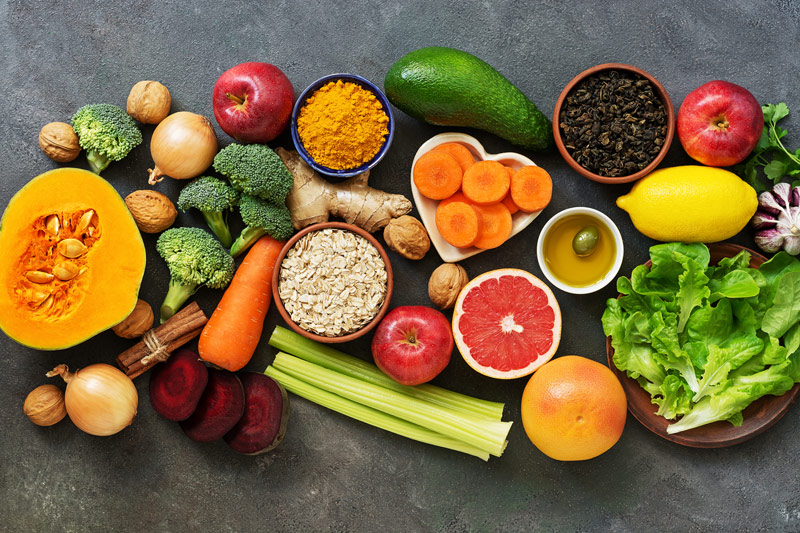Soluble fiber is quite the unsung hero when it comes to balancing hormones, detoxification, gut health, and more. In this article, we’re going to talk about why soluble fiber specifically is so important for your overall health. You’ll learn how it main benefits and get a grocery list of the top fiber foods to add to your daily diet.
Different Types of Dietary Fiber: Soluble vs Insoluble Fiber
Fiber is a part of plants-every plant has fiber in it and plants are the only thing that contain dietary fiber. While there are tons of different types of fiber, to simplify things, we can break them down into two main categories: soluble fiber and insoluble fiber.
Soluble fiber will dissolve if you put it in water. Insoluble fiber, on the other hand, won’t dissolve, no matter how viciously you stir it.
We’ve been taught that fiber goes in one hole, the mouth, and out the other (I think we know which one). But we’re actually missing the incredible power and benefits of fiber when we describe it like that, or like a roughage, because it’s way more than that.
The Health Benefits of Fiber
1 – Healthier Gut
For starters, soluble fiber is a prebiotic, meaning it feeds the microbes in your gut. It goes through the small intestine untouched, and when it arrives at the colon or large intestine, the microbes go crazy! The good microbes of course. Soluble fiber is the food source that allows them to grow stronger. Remember, a lot of diverse microbes are essential for health.
New studies show that when there isn’t enough fiber in the intestines, microbes begin to eat the intestine lining! This leads to inflammation, indigestion, and major chronic illness.
And remember, a healthier gut is essential for a better immune system and hormone health.
2 – Reduce Risk of Disease
Soluble fiber helps produce more anti-inflammatory microbes and then those microbes release short-chain fatty acids which are so important. Short-chain fatty acids have been shown to reduce the risk of inflammatory diseases, heart disease, type 2 diabetes, and obesity.
3 – Helps with Weight Control
Soluble fiber turns into a gel-like consistency that keeps food from moving from your stomach to your intestines too fast. This means that you’ll feel fuller for longer, and have a slower release of sugar into the bloodstream. So not only are you tamping down cravings, but you’re also regulating blood sugar helping SO many other things in the body, bringing me to my next point.
4 – Hormonal balance
Beyond regulating blood sugar, which can help keep hormone levels in tact, fiber also plays a huge role in helping your body detoxify excess hormones like estrogen. In fact, there’s clear evidence that a diet low in fiber can result in estrogen dominance or higher estrogen levels. Soluble fiber is essential for aiding kidneys and liver, two of our detox hormones. Soluble fiber helps to flush out of excess estrogens and decrease the risk for hormonal issues like PCOS, irregular menses, PMS, fertility issues, and more.
Everything truly is connected. A healthier gut = healthier hormones. And the same goes for a healthy immune system and regulated blood sugar. Including
5 – Supports Liver Detox
You may have heard about the bean protocol that is helping people all over the world heal from chronic illness. It has one rule: eat enough soluble fiber from beans per day. Why? Well, as we’ve learned, soluble fiber is necessary for detoxification. The liver needs soluble fiber to function at its best! Our liver is responsible for detoxifying drugs, heavy metals, hormones, and chemicals via bile. But without soluble fiber to take it completely out of the body, the nasty stuff just re-circulates!
Adding in beans, and other foods high in soluble fiber can help the liver flush the toxins/excess chemicals and hormones from the body for good.
Signs You’re Not Eating Enough Soluble Fiber
When we don’t eat enough food high in soluble fiber, here are some signs:
- Allergies
- Fatigue
- Stress
- Acne breakouts
- Excess/lack of hormone production
- Inflammation
- Autoimmune diseases
- Infertility
- Poor sleep
- Mental fog
- Poor digestion and bowel movement
- Hard time with weight loss
- Irritable bowel syndrome / inflammatory bowel disease
Foods High In Soluble Fiber
Beans are the number one food that is the highest in soluble fiber-by a long shot. Next up for a fiber rich food behind beans is oats and oat bran.
Then we have, in no specific order:
- Citrus fruits
- Greens
- Oatmeal and oat bran
- Barley
- Nuts
- Seeds
- Bananas
- Peas
- Lentils
- Beans
- Carrots
- Apples
- Brussels sprouts
- Flax and chia seeds
- Avocados
- Potatoes and sweet potatoes
- Dried fruits
- Psyllium husk
How much fiber should you eat per day?
Most of us aren’t getting nearly enough soluble fiber per day. According to the mayo clinic and American dietary guidelines, women should try to eat 21 to 25 grams of fiber per day while men should try for 30 to 38 grams.
According to Karen Hurd, the Bean Queen, we should be consuming 3 to 6 and a ½ cups of beans or lentils per day for soluble fiber!
Fiber Supplements
I recommend getting your fiber intake in through real foods, like the ones found in our Organic Immunity Greens. Healthy eating is the number one way to increase soluble fiber intake and overall health. So get your high fiber foods in!
In addition to your high fiber diet, you can also look for a psyllium husk fiber supplement capsule!
I hope this article has helped you understand the many benefits of soluble fiber and why you need to include it in your diet for hormone health and beyond. Let me know in the comments below your favorite bean recipe!





READ the Latest
Health Habits
Longevity
Health Habits
Health Habits